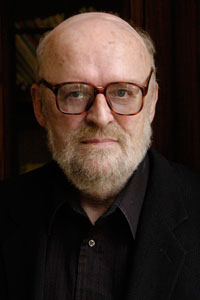Conference on Augustine to honor Tracy’s Christian theology research, teachings
By Josh Schonwaldjschonwa@uchicago.edu
News Office
 | |
David Tracy, one of the nation’s most influential Catholic theologians who recently retired after nearly 40 years at the University’s Divinity School, will be honored with a May conference focusing on Augustine of Hippo.
For three days beginning Sunday, May 4, some of the world’s leading theologians and philosophers will gather on the third floor of the Divinity School’s Swift Hall to talk about Augustine, one of the central figures in Christian and Western thought.
The conference will bring together such disparate thinkers as philosopher Vincent Carraud from the Universitè de Caen and theologian John Cavadini from Notre Dame, as well as Divinity School faculty members Jean Bethke Elshtain, the Laura Spelman Rockefeller Professor; Jean Luc-Marion, Professor of the Philosophy of Religion and Theology; and William Schweiker, the Edward L. Ryerson Distinguished Service Professor.
The conference, “Augustine: Theological and Philosophical Conversations,” is an important interdisciplinary appraisal of the reception of Augustine, said organizer Susan Schreiner, Professor of the History of Christianity and Theology in the Divinity School. Schreiner cites Jaroslav Pelikan, who said that in Western Christianity, “We are all footnotes to Augustine.”
It is fitting that a conference honoring Tracy will focus on Augustine, said Richard A. Rosengarten, Dean of the Divinity School. “Tracy is, without question, one of the foremost theologians engaging the Christian tradition today, and he’s a scholar of incomparable erudition on the nearly 2,000-year tradition of Christian theology,” said Rosengarten. “And what better figure to focus on than Augustine—one of the major figures in that tradition.”
What’s more, Rosengarten added, much of Tracy’s recent work on what is expected to be his magnum opus—a massive three-volume work on the nature of God—has focused heavily on Augustine.
Schreiner, Tracy’s longtime colleague and a historical theologian who has taught Augustine with him, added that Tracy’s choice of Augustine was more than a personal one.
 David Tracy | |
Widely regarded as an intellectually generous colleague, Tracy, the Andrew Thomas Greeley and Grace McNichols Greeley Distinguished Service Professor Emeritus in the Divinity School, recognized that there is surging interest in Augustine among his Divinity School peers.
Elshtain and Bernard McGinn, the Naomi Shenstone Donnelley Professor Emeritus in the Divinity School, have written about Augustine, and Marion recently completed a book on Augustine’s thought.
“A lot of scholars here have been interested in his work. There’s a sort of Augustinian Renaissance under way,” said Schreiner, who noted the renaissance began with interest in Augustine’s rhetoric. “Nonetheless, thinkers, both theological and philosophical, are also interested in his understanding of the self, the dialogue between Eastern and Western Christianity, his understanding of sin, grace and, of course, the Trinity.”
The number of scholars who wanted to take part in this conference, both to speak on Augustine and honor Tracy, was so numerous that Schreiner took her paper off the program. Scholars who were unable to participate will present papers on the topic, all of which will be published in a forthcoming book about the conference.
The “Augustine: Theological and Philosophical Conversations” conference will begin Sunday, May 4, with Rosengarten giving introductory remarks at 1:30 p.m.
Robert Pippin, the Evelyn Stefansson Nef Distinguished Service Professor of Social Thought, will then chair a group that includes Cavadini, who will discuss “Solidarity and Ideology in Augustine’s City of God;” Willemien Otten, Professor of the Theology and History of Christianity, who will discuss “The Open Self;” and McGinn, who will present “Notes on the History of an Augustinian Theme.” The Sunday portion of the conference will conclude with Tracy’s paper, “A Troubling Conflict: The Two Selfs in Augustine,” which will take place from 4:30 to 5:30 p.m. The conference will conclude Tuesday, May 6.
Schreiner and Tracy hope the three-day conference on Augustine, in addition to honoring Tracy, will communicate an important point about the institution. “It shows the enduring importance of the great tradition at the Divinity School. In our field, the importance of Augustine cannot be underestimated.
The conference is a way of letting students know that one must begin with the tradition when you start to think about theology. You don’t start in 1980. You start with Saint Augustine.”
More information and a full schedule of speakers may be found at http://marty-center.uchicago.edu/conferences/tracy/.
![[Chronicle]](/images/sidebar_header_oct06.gif)